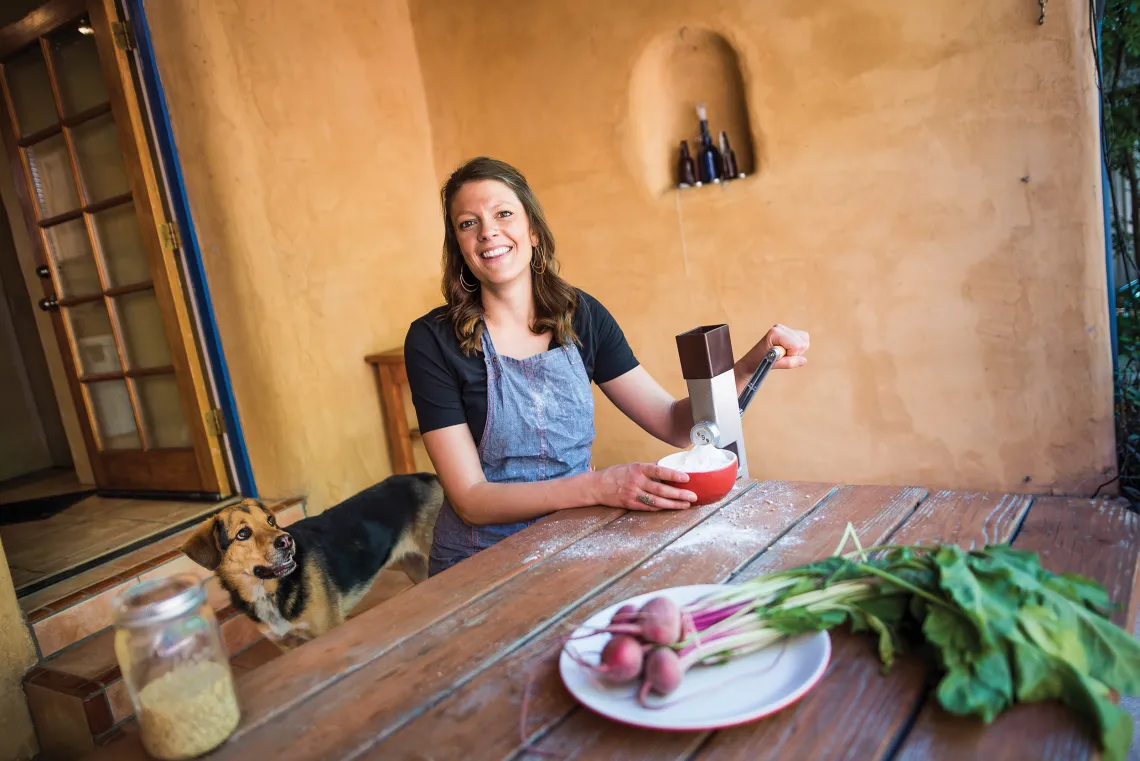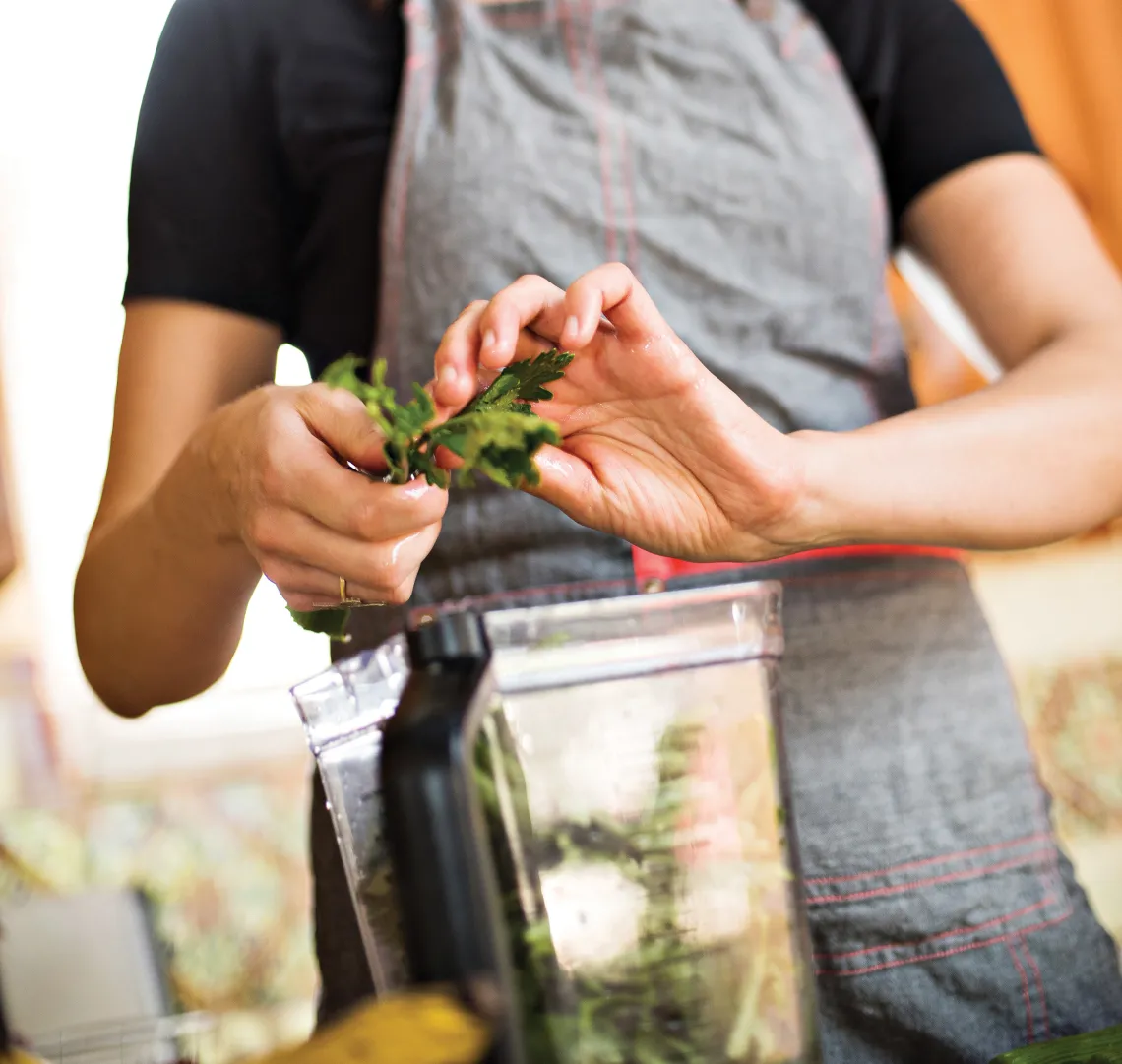Living Unprocessed
From creative writing to better eating

The first time Megan Kimble ’13 baked whole-wheat bread, it didn’t go well.
The yeast didn’t foam and the dough didn’t rise. And after it did its time in the hot oven, the flat loaf that emerged was more cutting board than bread, she says. In fact, what it most resembled, as she laments in her book, “Unprocessed: My City-Dwelling Year of Reclaiming Real Food,” was a “wheat Frisbee,” thin and hard as plastic.
That was on Day One of Kimble’s year-long project to eat food that was as unprocessed as possible.
It wasn’t always easy to decide which foods to choose. After all, “All foods are processed,” as she writes in the book. Even an apple is picked from a tree, washed and shipped to market. But there’s a world of difference between that apple and, say, Chex Mix, a highly processed manufactured food with a long list of added ingredients.
“There are degrees of processing,” she remembers explaining to her skeptical brother-in-law. “I’m trying to find the line when food becomes too processed.”
Over the 12 months of her culinary quest to honor that fine line, Kimble exiled foods with added sugars and mysterious additives. She feasted instead on fresh tomatoes from Arizona farms and tasty local goat cheese. She perfected the art of tempering chocolate in her kitchen and even sampled meat from a lamb that she helped slaughter. And, perhaps best of all, her homemade loaves of bread got better — much better.
Kimble’s book is an entertaining first-person account of her sometimes flailing efforts to walk the unprocessed line, combined with hard-nosed reporting about what she calls the “industrial food complex.”

“I got into food writing because I was interested in the environment,” Kimble says on a spring afternoon in her office in Tucson’s old barrio. A graduate of the University of Arizona’s highly regarded MFA program in creative writing, Kimble nowadays is managing editor of Edible Baja Arizona, a four-year-old food magazine.
“There are so many things you can talk about through food,” she continues. “Who are you paying for your food? What are the labor implications? Who’s being exploited? What’s the impact on economics and the environment?”
Her book reflects those concerns. She did prodigious shoe-leather reporting, tramping through a dairy farm that injects its cows with antibiotics and driving to the giant produce warehouses in the Arizona borderlands where millions of melons from Mexico are packaged and shipped.
Her culinary investigations also took her to local organic farms, food co-ops and farmers markets, enterprises that help preserve open land and practice environmentally friendly agriculture.
A champion of buying local, Kimble says that if people in a city the size of Tucson shifted just 10 percent of all their spending to local enterprises, the community would benefit from a brand-new revenue stream of about $140 million every year.
“‘Vote with your fork’ is a cliche,” she says, “but three times a day you have a choice.” And Kimble urges hungry voters to choose the local and the sustainable.
A Transformative Experience
Kimble’s time at the UA was invaluable in launching her career.
“I wrote 90 percent of the book as an MFA student,” she notes. “The program was transformative for me. I can’t say enough good things about it. It gave me time to write, a support system and classes in the program and across the university.”
A California native raised by vegetarian parents, Kimble always wanted to be writer. As an undergrad at the University of Denver, she worked at the school paper and did an internship at the Aurora Sentinel. After college, she landed a gig teaching English in Nicaragua and on the side wrote for an English-language newspaper.
A year later, back in the United States, she got hired as an editorial assistant at the Los Angeles Times. “But they were doing rounds of layoffs,” Kimble remembers. “I jumped ship when I got into grad school.”
She arrived in Tucson determined to write a book during the two years of the master’s program. She got her start when, in her very first semester, she took an elective class in the Geography of the Southwest with Jeff Banister in the School of Geography and Development.
“Jeff was going to Nogales for food research,” Kimble recalls. “I went with him three times to visit the food warehouses.”
Kimble was awestruck by the size of the operations: so many trucks, so many fruits, so many boxes. It was her first up-close view of the resources required to sustain our industrial food system, she says. “I was really excited about reporting the story, about where food comes from. It touches on the environment, on global warming, on economics.”
She published an article on the food brokers in an online venue. Ultimately, that work became the first piece of her book.
With encouragement from fellow students in the writing workshop, she launched her year of living unprocessed in her second semester. Her faculty adviser for the project, Chris Cokinos, an author with an interest in the environment, was a good fit for Kimble. His books, like hers, mix memoir with research.
She also connected with Gary Paul Nabhan, the renowned ethnobiologist and author who holds the W.K. Kellogg Endowed Chair in Sustainable Food Systems at the Southwest Center. Nabhan eventually introduced her to Doug Biggers, a publisher on the verge of launching a new food magazine.
By the time Kimble graduated in May 2013, she had a 300-page draft of her book and a job offer from Biggers’ Edible Baja Arizona.
She was thrilled to get a job as a food journalist. With reporting jobs scarce these days, “I never expected to get a full-time journalism job.”
The month she graduated, she and the rest of the new editorial team got the first issue of Edible out. In June, Kimble put together a formal book proposal. By August, she had an agent; by the next spring she had a book contract with the revered William Morrow imprint, and by 2015 she had a book.
“I’d like to write another book,” she says, “but not right now. I’m writing and doing journalism.”
Her stories for the magazine have included deep-dive pieces into the food delivered to the 48,000 schoolchildren in Tucson Unified School District and the role of food and restaurants in the recent revival of downtown Tucson.
As the author of “Unprocessed,” she’s often asked how people can improve their diets. You don’t have to be rich to eat well, she says. She herself was “urban, broke, busy,” when she undertook her real-food year. Cooking your own food is cheaper than eating out, and buying in bulk saves money.
“Buy great ingredients: bread, cheese, great tomatoes,” she advises. “All of them are affordable.”
Cooking your own food is the best way to eat healthfully, but, she says, “People think cooking is difficult and time-consuming. It’s really not as hard as you think it is. Fifteen-minute dinners are my sweet spot: I roast veggies and eat a lot of beans and grains.”
When it comes to produce, “the best thing is to buy from a farm. Second best is to buy organic.” And third best is to buy a pepper from the supermarket. Eating a vegetable from a big corporate farm, she says, is better that eating no produce at all.
Other rules to live by: Eat real foods, like carrots or broccoli, that don’t have ingredient labels. When there is an ingredient label, read it, then choose foods with the shortest lists. Avoid foods with added sugar. Make milk and meat occasional treats, buying only the expensive organic kinds that come from animals raised humanely and not treated with antibiotics.
“I still probably eat 80 or 90 percent unprocessed,” Kimble says. “I’m 90 percent vegetarian. I still cook most of my meals.”
And these days she’s happy to outsource when she can.
“We have a great guy in town for bread,” she says: “Don Guerra of Barrio Bread.” Guerra makes his acclaimed bread with unprocessed wheat he gets from a local farm (see story on Page 37).
So although her baking skills have improved, nowadays, Kimble eats his bread — not her own.
Megan Kimble’s book “Unprocessed: My City-Dwelling Year of Reclaiming Real Food,” published by William Morrow in 2015, is available in bookstores.
‘The [MFA] program was transformative for me. I can’t say enough good things about it. It gave me time to write, a support system and classes in the program and across the university.’
